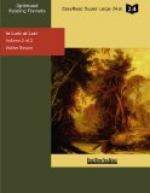“I now know that he has forgiven me; he forgave me on his death-bed; he revoked his former will and made me his sole heir—just as if nothing had happened to destroy his old affection—subject to one condition—viz., that the girl to whom I was first engaged should receive the whole income until I, or my heirs, should return to England in order to claim the inheritance.
“It is strange. I die in a wooden shanty, in a little Western town, the editor of a miserable little country paper. I have not money enough even to bury me, and yet, if I were at home, I might be called a rich man, as men go. My little Iris will be an heiress. At the very moment when I learn that I am my father’s heir, I am struck down by fever; and now I know that I shall never get up again.
“It is strange. Yet my father sent me his forgiveness, and my wife is dead, and the wealth that has come is useless to me. Wherefore, nothing now matters much to me, and I know that you will hold my last wishes sacred.
“I desire that Iris shall be educated as well and thoroughly as you can afford; keep her free from rough and rude companions; make her understand that her father was a gentleman of ancient family; this knowledge will, perhaps, help to give her self-respect. If any misfortune should fall upon you, such as the loss of health or wealth, give the papers inclosed to a trustworthy solicitor, and bid him act as is best in the interests of Iris. If, as I hope, all will go well with you, do not open the papers until my child’s twenty-first birthday; do not let her know until then that she is going to be rich; on her twenty-first birthday, open the papers and bid her claim her own.
“To the woman I wronged—I know not whether she has married or not—bid Iris carry my last message of sorrow at what has happened. I do not regret, and I have never regretted, that I married Alice. But, I gave her pain, for which I have never ceased to grieve. I have been punished for this breach of faith. You will find among the papers an account of all the circumstances connected with this engagement. There is also in the packet my portrait, taken when I was a lad of sixteen; give her that as well; there is the certificate of my marriage, my register of baptism, that of Iris’s baptism, my signet ring—” “His arms”—the old man interrupted his reading—“his arms were: quarterly: first and fourth, two roses and a boar’s head, erect; second and third, gules and fesse between—between—but I cannot remember what it was between—” He went on reading: “My father’s last letter to me; Alice’s letters, and one or two from yourself. If Iris should unhappily die before her twenty-first birthday, open these papers, find out from them the owner’s name and address, seek her out, and tell her that she will never now be disturbed by any claimants to the estate.”
The letter ended here abruptly, as if the writer had designed to add more, but was prevented by death.




